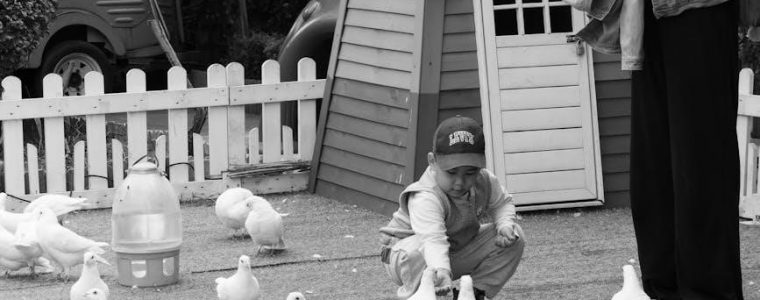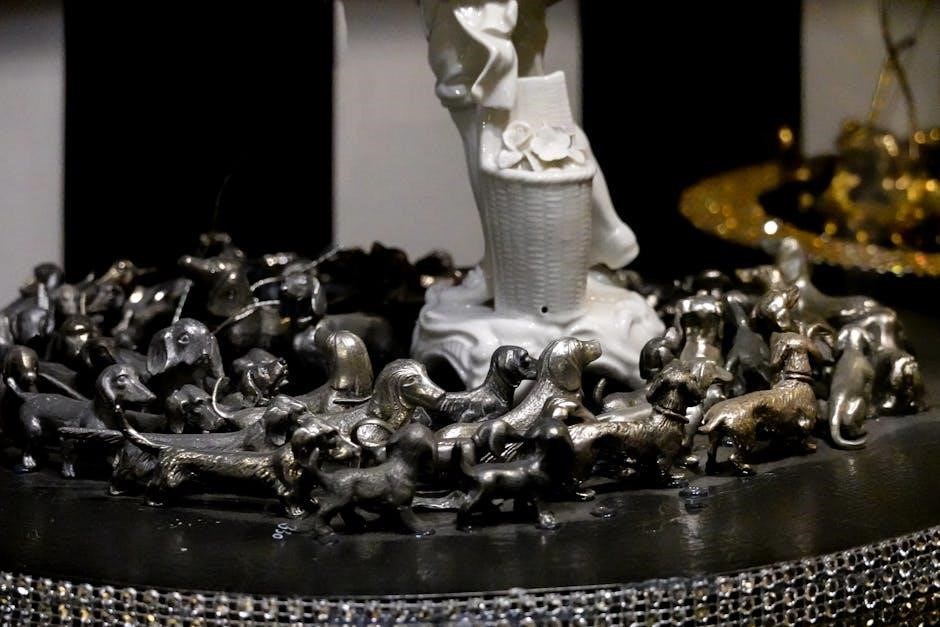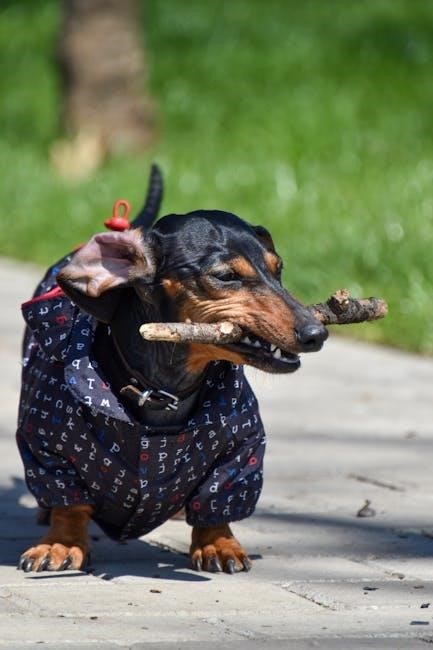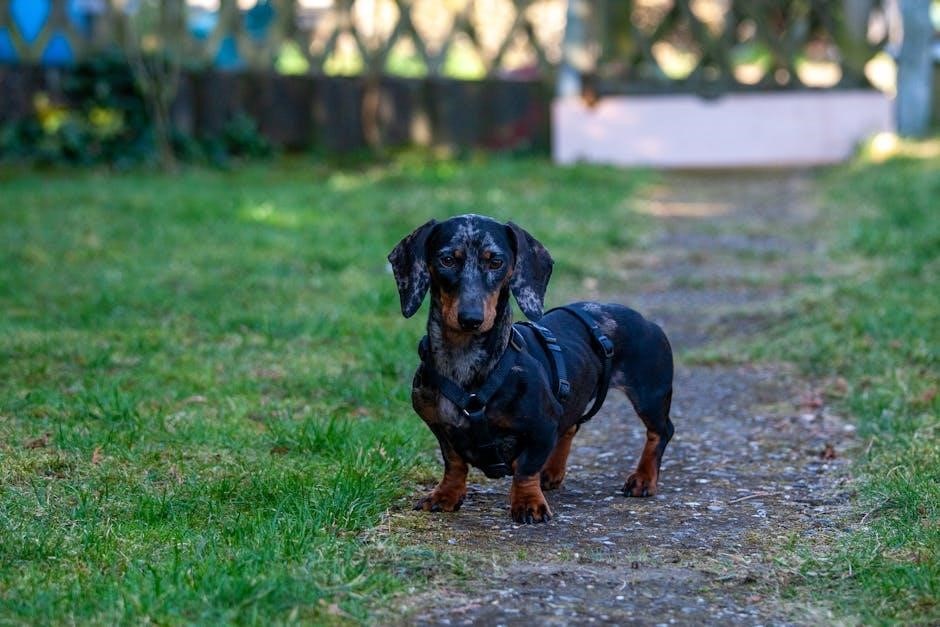
miniature dachshund feeding guide
Miniature Dachshunds require a tailored feeding approach to maintain their energy levels and prevent health issues. This guide provides essential insights for every life stage, ensuring optimal nutrition.
Understanding the Nutritional Needs of Miniature Dachshunds
Miniature Dachshunds require a balanced diet rich in protein, fats, and carbohydrates. Their small size and active nature demand careful nutrient intake to support energy and health needs.
Essential Nutrients for Miniature Dachshunds

Miniature Dachshunds need a diet rich in high-quality protein from sources like chicken or fish to support muscle growth. Fats, particularly omega-3 and omega-6 fatty acids, are crucial for skin and coat health. Carbohydrates provide energy, while fiber aids digestion. Essential vitamins like A, D, and E support immune function and vision. Minerals such as calcium and phosphorus are vital for bone health. Proper nutrient balance ensures overall well-being and prevents deficiencies. Consulting a vet can help tailor dietary needs for optimal health outcomes.
Factors Influencing Dietary Requirements
Age, weight, and activity level significantly impact a Miniature Dachshund’s dietary needs. Puppies require more protein and calories for growth, while seniors may need fewer calories to prevent obesity. Health conditions, such as obesity or joint issues, also influence diet choices. Additionally, seasonal changes or lifestyle adjustments can affect energy expenditure. Regular vet check-ups help tailor feeding plans to individual needs, ensuring optimal health and vitality throughout their life stages. Monitoring these factors helps prevent nutritional imbalances and supports overall well-being.
Choosing the Right Food for Your Miniature Dachshund
Selecting high-quality food tailored to your Miniature Dachshund’s life stage and health needs is crucial. Look for balanced nutrition with essential proteins and avoid fillers for optimal health.
Kibble vs. Wet Food: Pros and Cons
Kibble is convenient, cost-effective, and supports dental health, while wet food offers higher moisture content and palatability. Kibble’s crunchy texture can help reduce tartar, benefiting dental health, but may lack moisture, potentially leading to dehydration if water intake is insufficient. Wet food, on the other hand, can be more appealing to picky eaters and is often lower in carbohydrates, which may aid in weight management. However, it is more expensive, has a shorter shelf life, and may contribute to weight gain if overfed. For Miniature Dachshunds, a balanced approach or combination of both can be beneficial, depending on individual needs and preferences.
Raw Diet: Benefits and Risks
A raw diet mimics a natural, ancestral diet, offering potential benefits like improved digestion and reduced allergies. Proponents argue it can enhance energy levels and coat health. However, risks include bacterial contamination from raw meat, posing health threats to both dogs and owners. Additionally, an unbalanced raw diet may lack essential nutrients, leading to long-term health issues. It’s crucial to consult a veterinarian before transitioning to ensure proper nutrition and safety. While some dogs thrive on raw diets, others may not, making it a controversial yet potentially rewarding option for Miniature Dachshunds.
Feeding Schedule for Miniature Dachshunds
Feed puppies 3-4 times daily, adults twice, and seniors 1-2 times, adjusting based on age, size, and activity level for optimal health and energy balance.
Feeding Puppies

Miniature Dachshund puppies require frequent, nutrient-rich meals to support rapid growth and energy needs. Feed 3-4 times daily, ensuring high-quality puppy food with balanced protein, fats, and minerals. Avoid overfeeding to prevent obesity. Monitor weight and adjust portions as they grow. Transition to adult food gradually around 12 months. Consult a vet for personalized advice to ensure healthy development and avoid potential health issues associated with improper nutrition.
Feeding Adult Dogs
Adult Miniature Dachshunds typically require 1-2 meals daily, focusing on high-quality dog food rich in protein and low in fats to maintain a healthy weight. Kibble is ideal for dental health, while wet food can add moisture. Avoid overfeeding, as Dachshunds are prone to obesity. Monitor their weight and adjust portions accordingly. Ensure balanced nutrients to support energy levels and overall health. Avoid treats high in calories or harmful ingredients. Regular veterinary check-ups can help tailor their diet to specific needs, ensuring they remain active and healthy throughout adulthood.
Feeding Senior Dogs
As Miniature Dachshunds age, their metabolism slows, requiring adjustments to their diet to prevent obesity and support joint health. Senior dogs benefit from nutrient-rich, easily digestible food with reduced calories and fat. Incorporate supplements like glucosamine for joint health. Avoid overfeeding by monitoring portion sizes and activity levels. Dental-friendly kibble can help maintain oral health, while wet food may ease chewing for older dogs. Regular veterinary check-ups are crucial to address age-related health issues. Tailor their diet to ensure they remain comfortable and active in their golden years, focusing on balanced nutrition for longevity.

Portion Control and Avoiding Overfeeding
Monitor your Miniature Dachshund’s food intake to prevent obesity. Measure portions carefully, adjusting for age and activity. Avoid overfeeding, as it can lead to weight-related health issues.
Signs of Overfeeding
Recognizing signs of overfeeding is crucial for your Miniature Dachshund’s health. Look for weight gain, lethargy, and difficulty moving. Theirwaistline may disappear, and they might develop skin issues or joint pain due to excess weight. Monitoring their eating habits and adjusting portions can prevent these issues. Regular weigh-ins and vet check-ups ensure you stay on track. Overfeeding can lead to serious health problems, so it’s important to maintain a balanced diet and exercise routine for your dog’s well-being.
Measuring Food Portions
Accurate food portion measurement is vital for your Miniature Dachshund’s health. Use a digital kitchen scale or measuring cups to ensure precise amounts. Refer to the food manufacturer’s guidelines for daily recommendations, then adjust based on your dog’s activity level, age, and weight. Avoid free-feeding by using portion-controlled meals. Consistency is key to maintaining a healthy weight and preventing overfeeding. Monitor your dog’s condition and consult your vet if you notice any changes. Proper portion control supports overall well-being and helps avoid potential health issues linked to excess weight.

Monitoring Your Miniature Dachshund’s Health
Regular vet check-ups, weight monitoring, and observing physical condition are crucial. Watch for changes in appetite, energy, or behavior, and adjust their diet as needed.
Weight Management
Maintaining a healthy weight is crucial for Miniature Dachshunds to prevent obesity and related health issues. Monitor their food intake and ensure portion sizes align with their activity levels. Regular exercise, such as short walks and playtime, helps burn calories and maintain muscle tone. Avoid overfeeding treats, as this can lead to weight gain and back problems. Use a measuring cup for accuracy and consult your vet for a personalized weight management plan. A balanced diet and consistent exercise routine are key to keeping your Miniature Dachshund in optimal shape and preventing obesity-related health complications.
Adjusting Diet Based on Health Conditions
Miniature Dachshunds with health conditions may require dietary adjustments to manage symptoms and improve quality of life. For instance, dogs with obesity or back issues may need calorie-restricted or weight management diets. Those with food allergies or sensitivities may benefit from hypoallergenic or novel protein sources. Consult your veterinarian to tailor your dog’s diet to their specific health needs, ensuring they receive the right balance of nutrients while avoiding triggers. Regular check-ups and monitoring are essential to make adjustments as needed, keeping your Miniature Dachshund healthy and comfortable throughout their life.

Treats and Snacks for Miniature Dachshunds
Treats and snacks can reward good behavior but should be low-calorie and healthy. Opt for small, nutrient-rich options like baby carrots or green beans to avoid overfeeding.
Healthy Treat Options

Healthy treats for miniature dachshunds should be nutrient-rich, low in calories, and easy to digest. Baby carrots, green beans, and air-dried liver are excellent choices. Small pieces of apple or blueberries can also be given in moderation. Avoid sugary or high-fat snacks, as they can lead to weight gain. Homemade options like plain, unseasoned yogurt or small portions of cooked chicken are ideal. Always ensure treats do not make up more than 10% of their daily calorie intake to prevent overfeeding. Choose single-ingredient, additive-free options to keep your dachshund healthy and happy.
Foods to Avoid Giving
When feeding your miniature dachshund, it’s crucial to avoid certain foods that can harm their health. Chocolate, caffeine, and alcohol are toxic due to substances like theobromine. Grapes, raisins, and currants can cause kidney failure. Onions, garlic, and chives contain compounds that damage red blood cells. Processed foods, fried items, and high-sugar snacks should be avoided to prevent obesity and digestive issues. Cooked bones and rawhide can splinter or block the digestive tract. Never feed table scraps, as they can lead to overeating and imbalanced nutrition. Always stick to dog-specific, nutrient-rich foods to ensure their well-being.
Creating a balanced feeding plan for your miniature dachshund is essential for their long-term health and happiness. By understanding their nutritional needs, selecting high-quality foods, and maintaining portion control, you can ensure they thrive. Regular monitoring of their weight and health allows for adjustments to their diet as they grow and age. Avoid unhealthy treats and stick to nutrient-rich options tailored to their life stage. With consistency and care, your miniature dachshund will enjoy a vibrant, energetic life. Always consult a veterinarian for personalized advice to make informed decisions for your furry companion.